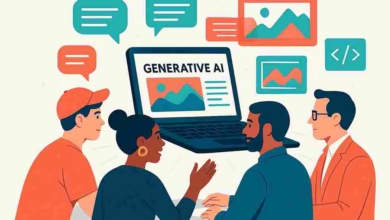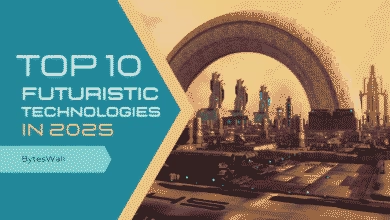Top 10 Sustainable Tech Innovations of 2025: From Ocean Cleanup to Solar-Powered Swarms

Top 10 Sustainable Tech Innovations of 2025: From Ocean Cleanup to Solar-Powered Swarms
A Greener Future with Tech Innovation
In 2025, sustainable technology is at the forefront of global efforts to combat climate change, reduce waste, and promote a circular economy. From cleaning up our oceans to harnessing the sun’s energy in innovative ways, tech advancements are paving the way for a more sustainable future. The International Energy Agency (IEA) projects that renewables will account for nearly 95% of the net increase in global power capacity through 2025, with solar photovoltaic (PV) leading the charge. At BytesWall, we’re highlighting the top 10 sustainable tech innovations of 2025 that are making a real impact. Plus, we’ve included a downloadable checklist to help you adopt these technologies in your organization or community.
Top 10 Sustainable Tech Innovations of 2025
1. The Ocean Cleanup’s Swarm Robotics Initiative
The Ocean Cleanup has deployed a swarm of 500 autonomous robots to tackle ocean plastic pollution in the Pacific Garbage Patch. These solar-powered robots, equipped with AI, coordinate to collect 10,000 tons of plastic annually—a 20% increase from 2024. This initiative has also reduced operational costs by 18% through swarm coordination, showcasing the power of collective intelligence in addressing environmental challenges.
2. Solar-Powered Swarm Drones for Reforestation
Drones and GIS technologies are aiding habitat restoration, as noted by StartUs Insights. In 2025, companies like Flash Forest are using solar-powered drone swarms to plant trees at scale. These drones can plant 1,000 trees per day, with onboard solar panels extending their operational time. This tech has contributed to reforesting over 500 acres of public land, supporting biodiversity and carbon sequestration efforts.
3. Perovskite Solar Cells for Higher Efficiency
Perovskite solar cells have reached a power conversion efficiency of 26.08%, surpassing traditional silicon cells, according to Forbes. Researchers in Singapore’s Institute of Materials Research and Engineering (IMRE) have improved their durability using encapsulation methods to prevent lead leakage, making them a viable option for widespread adoption in 2025.
4. AI-Powered Precision Agriculture
AI-driven algorithms are transforming agriculture, as highlighted by Neste. UN Climate Change’s Initiative on Artificial Intelligence for Climate Action notes that AI can analyze soil data, plant health, and weather forecasts to optimize irrigation and fertilization. In 2025, tools like ecoRobotix’s weeding robots reduce chemical use by 30%, cutting agricultural emissions by 25–30%, per the Food and Agriculture Organization (FAO).
5. Carbon Capture and Utilization with Solid Wastes
IMRE researchers are using mixed plastic feedstock to generate porous carbon materials for CO2 capture. This technology, which also utilizes solid wastes like steel slag and biomass, is gaining traction in 2025, offering a dual solution for waste management and carbon reduction.
6. Solar-Powered High-Altitude Platform Systems
Sceye’s High-Altitude Platform Systems (HAPS) use helium to lift solar-powered platforms into the stratosphere, functioning as geostationary satellites without rocket launches. CNET reports that in 2025, these platforms are providing sustainable connectivity to remote areas, reducing the carbon footprint of traditional satellite launches.
7. Smart Waste Management with AI
AMP Robotics uses AI-powered sortation technology to improve recycling efficiency by 70%, as per Carbon Trail. In 2025, these systems are reducing landfill waste by precisely sorting recyclables, supporting a circular economy where waste is treated as a resource.
8. Renewable Energy Storage with Vanadium Flow Batteries
North Harbour Clean Energy in Australia is developing utility-scale energy storage solutions, including vanadium flow batteries, to store solar and wind energy. StartUs Insights notes that these batteries offer a cycle life of approximately 10,000 cycles, making them ideal for sustainable energy grids in 2025.
9. Sustainable Aviation Fuel (SAF) Adoption
Sustainability-news.net highlights that sustainable aviation fuel (SAF) is reducing aviation emissions, which account for 2–3% of global CO2. In 2025, Singapore Airlines’ SAF credit system allows passengers to offset emissions, driving demand for this eco-friendly fuel alternative.
10. Green Hydrogen Production with Modular Electrolysis
Verdagy’s scalable, modular electrolyzer technology is lowering the cost of green hydrogen production, as reported by CNET. In 2025, this innovation is making green hydrogen competitive with fossil fuels, supporting the electrification of transport and industrial sectors.
Downloadable Checklist for Sustainable Tech Adoption
To help you integrate these sustainable technologies into your organization or community, we’ve created a concise checklist. Download it below to guide your sustainability journey.
Download Your Sustainable Tech Checklist
Download PDFThe Future of Sustainable Tech
The innovations of 2025 are setting the stage for a sustainable future. From The Ocean Cleanup’s swarm robotics to solar-powered drones and green hydrogen, these technologies are reducing emissions, conserving resources, and fostering a circular economy. As the World Economic Forum notes, biodiversity loss is among the top threats facing humanity, but these advancements are helping to mitigate such risks. By adopting these technologies, we can collectively build a resilient, eco-friendly world for generations to come.
BytesWall: Innovating for a Sustainable Tomorrow
Join the Sustainability Movement
Which sustainable tech innovation excites you the most? Share your thoughts in the comments and join the conversation with #SustainableTech2025!
Discover more eco-friendly innovations at BytesWall.com—your hub for sustainable tech insights!




